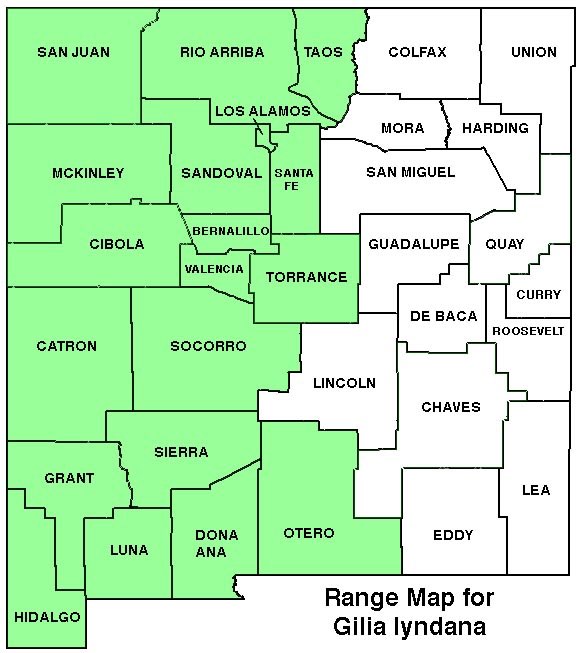WILDFLOWERS OF NEW MEXICO

This petite flower has one to several 3–12 inch tall stems from a basal rosette of dense to thin cobwebby, pinnately-lobed leaves. The upper stem is glandular-hairy with only a few branches, and tipped with open clusters of small, funnel-shaped flowers with pinkish, pale-blue, or white lobes. Note the yellow throat, and the flower tube slightly extends beyond the pointed lobes of the calyx holding the flower.
FLOWER: March–June. Flower tube 3/16–5/16 inch long (5–8 mm) from base to throat of which about 1/4 extends above the tips of the calyx lobes; throat yellow, anthers blue; calyx hairless or sparsely covered with glandular hairs, lobes are long, pointed, generally with red to purplish dots or splotches.
LEAVES: Basal rosette and alternate and smaller on stem. Blades moderately to densely cobwebby-hairy with pinnate lobes along midrib, lobes linear to oblong with pointed tips.
HABITAT: Sandy, gravelly soils of desert grasslands, rangeland, drainages, foothills, roadsides, disturbed areas; desert grasslands and scrub, pinyon-juniper woodlands.
ELEVATION: 4,800–7,000 feet.
RANGE: NM (This combines the NM ranges for G. inconspicua and G. flavocincta var. australis. Detailed observations and review of herbarium specimens will help clarify the range in the Southwest.).
SIMILAR SPECIES: Eye Gilia, G. ophthalmoides, in the nw quarter of NM, typically has highly branched stems. El Paso Gilia, G. mexicana, in sw NM has tiny flowers with the flower lobes barely above the calyx lobes.
NM COUNTIES: The western half of NM in low- to mid-elevation, dry habitats: Bernalillo, Carton, Cibola, Dona Ana, Grant, Hidalgo, Los Alamos, Luna, McKinley, Otero, Rio Arriba, San Juan, Sandoval, Santa Fe, Sierra, Socorro, Taos, Torrance, Valencia.
NOTE: The confusing group of cobwebby Gilias recently has been reorganized by Kelly Allred (Flora New Mexicana, 2020) to create a new species designation, G. lyndana, that replaces G. flavocincta subsp. australis. In NM, what has been called G. inconspicua now belongs to G. clokleyi, G. lyndana, G. mexicana, and G. ophthalmoides. Gilia inconspicua occurs in the intermountain west and westward and northward.

LYNDA’S GILIA
GILIA LYNDANA ( Gilia flavocincta subsp. australis)
Phlox Family, Polemoniaceae
Annual herb


THE CONTENTS OF THIS WEBSITE ARE COPYRIGHTED AND CANNOT BE USED
WITHOUT PERMISSION OF GEORGE OXFORD MILLER
EMAIL ME




Cobwebby hairs more or less cover the leaves and lower stem.


Flower color varies from pale-blue to whitish or pinkish.